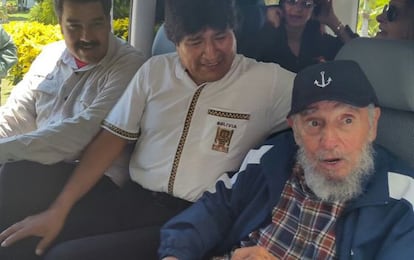Morales and Maduro visit Fidel Castro on his 89th birthday
Accompanied by Venezuelan president, Cuban ex-leader surprises Bolivian chief at his hotel Two statesmen visit island just one day before US State Secretary John Kerry’s historic trip


Fidel Castro celebrated his 89th birthday on Thursday by making a surprise visit to see Bolivian leader Evo Morales in his hotel room in Havana along with a small group of officials, who also included Venezuelan President Nicolás Maduro.
Morales was getting ready to go to Castro’s home, where the two had been scheduled to meet, when the former Cuban president suddenly showed up at his hotel instead, the Bolivian News Agency (ABI) reported.
Kerry’s trip to Havana will be the first time a US secretary of state has gone to Cuba in 70 years
Both Morales and Maduro were in Cuba to celebrate Castro’s birthday, which took place one day before US Secretary of State John Kerry was expected to arrive in Havana to take part in the official ceremony to reopen the US Embassy, which for more than 50 years has only functioned as a US Interests Section.
Kerry’s visit to Havana will mark the first time a US secretary of state has set foot in Cuba in more than 70 years.
Castro’s surprise visit marked a rare opportunity for the media to photograph and speak to the historic revolutionary figure who has made only rare, unannounced public appearances since he gave up the presidency to his brother, Raúl, in 2006 because of ill health.
Fidel Castro now spends his days writing columns for Granma, the official Cuban Communist Party newspaper.
“I give all my love in the world to Bolivia,” Castro told Morales, who arrived on Wednesday night, according to ABI.
“I am very happy to be here for the birthday of our brother Fidel Castro,” Morales said.
When asked about the normalization of diplomatic relations between the United States and Cuba, the Bolivian president called it a “victory for the Cuban people and for all global unity.”
Cuba reopened its embassy in Washington last month as the United States and Havana continue to hold a long series of private negotiations to iron out their problems and reinstate full diplomatic relations, which were broken during President Dwight Eisenhower’s last year in office in 1961.
President Barack Obama and Raúl Castro announced their intention to reopen their respective embassies in July.
But the two countries still face thorny issues in their talks, including Cuba’s demand for the US to end its economic embargo and Washington’s concerns about human rights in the Caribbean nation.
Fidel Castro also marked his birthday by publishing a Granma column in which he reflected on humanity’s suffering, remembering the nuclear bombs dropped on Hiroshima and Nagasaki 70 years ago this month and making reference to the growth of the United States’ geopolitical power in the aftermath of World War II.
The two nations still face thorny issues, such as the Cuban embargo and US concerns about human rights
“Writing is a way to be useful if you believe that our long-suffering humanity must be better and more fully educated, given the incredible ignorance that surrounds us all, apart from the researchers who seek satisfactory answers in the sciences,” he wrote in his column, entitled “Reality and Dreams.” “It is a word that implies in a few letters its immense content.”
Castro also reminded the United States that it still owes Cuba a lot of money after Washington froze the country’s cash reserves in US banks and suspended lease payments for Guantánamo Naval Base, where the US Defense Department has been operating a prison for suspected terrorists since 2002.
“Cuba is owed compensation equivalent to damages, which have reached many millions of dollars, as our country has denounced with irrefutable arguments and facts in our interventions in the United Nations,” he wrote.
Tu suscripción se está usando en otro dispositivo
¿Quieres añadir otro usuario a tu suscripción?
Si continúas leyendo en este dispositivo, no se podrá leer en el otro.
FlechaTu suscripción se está usando en otro dispositivo y solo puedes acceder a EL PAÍS desde un dispositivo a la vez.
Si quieres compartir tu cuenta, cambia tu suscripción a la modalidad Premium, así podrás añadir otro usuario. Cada uno accederá con su propia cuenta de email, lo que os permitirá personalizar vuestra experiencia en EL PAÍS.
¿Tienes una suscripción de empresa? Accede aquí para contratar más cuentas.
En el caso de no saber quién está usando tu cuenta, te recomendamos cambiar tu contraseña aquí.
Si decides continuar compartiendo tu cuenta, este mensaje se mostrará en tu dispositivo y en el de la otra persona que está usando tu cuenta de forma indefinida, afectando a tu experiencia de lectura. Puedes consultar aquí los términos y condiciones de la suscripción digital.








































